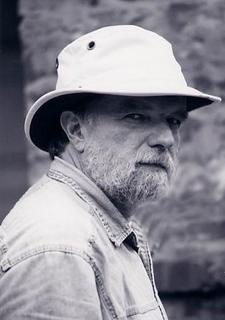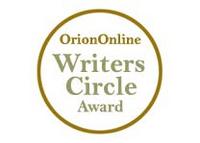


Hiroshima on Main
by Roger Pinckney
There was the usual first class rush off the plane at Minneapolis, then a long gap in the line, while the crowd stirred and twitched and fretted. (This was back when you could walk to the gate without a ticket, back before September 11.) Then came the Old Man, punch drunk from altitude and Jack Daniels, survivor of his first commercial flight, survivor of the Great Depression and the Second World War. He was eighty and a little shaky; even sober, even on solid ground.
My daddy was a helluva man. He had put himself through the University of South Carolina, a major in art and engineering, by lettering billboards saying See Rock City, Chew Brown's Mule, Drink Dixie Cola. But then came Pearl Harbor and Saipan and Tinian and Luzon, and finally Okinawa.
My own days in South Carolina were scarcely less dramatic. I grew up across the river from the Marine training camp at Parris Island, and came to honky tonk-age with the crazies just back from Vietnam. A drunken corporal told of thrusting the muzzle of his M-16 between the legs of a young Vietnamese girl, lifting her screaming and wriggling, threatening to pull the trigger unless her mother gave him oral sex. Another, of taking three villagers up in a chopper, and throwing two off before interrogating the third. A friend, crabbing around Parris Island that summer, discovered the sodden remains of one of the Proud, the Brave, the Few, who had toppled into the river after severing his femoral arteries on razor wire strung to prevent him going AWOL. Crabs and little fish had taken his face. Dental records said he was a draftee from New Jersey.
This is damned inconvenient to remember now, Marines being heroes in Afghanistan and Iraq. But it was1965, and I swore I wouldn't go. When the dust finally settled, I remained a free man, but a virtual exile from home and family, finding refuge, finally, on a northern Minnesota farm. It was twenty years before I saw the Old Man again. And that's how we came to be in the Minneapolis airport on an August afternoon.
We had another two hundred miles to go that hot day, but first I offered him a whirlwind tour of the Twin Cities. We drove Summit and Grand Avenues, where he reckoned the homes of the robber barons were less impressive than those of southern slaveholders. We stopped at the monument to the Union dead across from St. Paul's cathedral, where he refused to get out of the truck when I told him Minnesota Yankee volunteers had broken the great Confederate charge at Gettysburg. Noon found us on the banks of the Mississippi, walking brick streets in the oaken shade while the river murmured at our feet and the city rumbled above.
I was hungry and suggested lunch at a nearby Japanese restaurant. "Is that one of those places where they chop the food at your table?" I nodded. There was a pause and then, "I'm sorry son; I can't get that close to a Jap with a knife."
He looked out the window and went on. "It was on Saipan in forty four. I was a forward observer for our artillery. The Japanese headed north, took two thousand women and children with them. We dropped leaflets. We would open the lines and let civilians out. All they had to do was wear white."
The Old Man had had orders to monitor the exodus. "I could see rivers of white," he said, "moving down the valley below me."
But the movement was not civilian. In one great banzai charge into Eternal Glory, nearly every Japanese soldier on Saipan came howling down upon the unsuspecting Marines,.
"I seen them haul our men out of ambulances, the officers rip them open with their swords." He pointed a quarter mile to the far bank of the Mississippi. "I was as close as that."
"What happened to the civilians?" I asked.
"They marched them off cliffs into the sea all the while. Our ships tried to pick up the survivors but their propellers fouled on the bodies."
We ate burgers instead and the Old Man fell asleep in the truck, twitching and mumbling through an old soldier's dreams.
It would be years before I discovered the rest of the story. With the Marines that bloody June day was Robert Sherrod, a combat correspondent for Time and Life. After the rush of bayonets and long knives, Sherrod went to Marpi Point to investigate rumors of civilian deaths below the cliffs. Sherrod, who had covered the war from Attu to Tarawa, was unprepared for what he saw: hundreds of bodies -- men, women, children -- bobbing in the surf, and a few stragglers, ritually bathing before drowning, or wrapping themselves in flags before blowing themselves apart with hand grenades.
Sherrod staggered back to his typewriter. "Do the suicides of Saipan," he asked, "mean that the whole Japanese race will choose death before surrender?"
"The Nature of the Enemy" ran in Time in August, 1944. Translated and manipulated, it became a major Japanese propaganda exhortation, urging death rather than surrender.
Some Japanese did embrace national self-destruction. Great hordes of kamikaze pilots hurled themselves against American ships. They certainly believed. And so did Harry Truman. After reading Sherrod's account, he believed he was saving half a million American lives when he ordered the nuclear annihilation of Hiroshima and Nagasaki. My daddy, it seems, was witness to a pivotal moment in world history.
Our years echo with litanies of what ifs and why nots. Allow me a few more. What if the Old Man had been able to identify those multitudes streaming out of the jungle and called down massive artillery fire? Would the attack have butchered the Marines? Would Robert Sherrod have written that piece that galvanized Japanese propagandists and steeled Harry Truman? What about Hiroshima? Nagasaki? The forty year nuclear standoff with the Soviet Union? What about those missiles, the ones that survived the flurry of goodwill of the nineties, that are still armed and ready, as we eat, sleep, make love and die?
Some things seem certain. History's turntable moves on an exceeding fine axle. And that all of us, Russian, American, Vietnamese, Japanese, Christian and Moslem, Rebel and Yankee, are connected by the intricate web of life we have been given, and equally by the hateful entanglements we have created.
But now we have Kim Jung Il, and maybe still Saddam and maybe still Osama, and at least one of them has a nuclear bomb. Our new predicament in the world may have been divined by Shakespeare in Macbeth when he wrote, "This even handed justice commends the ingredience of our poisoned chalice to our own lips."
Those were some things I learned one horrible and lovely August afternoon a long time ago, while a great city went about its noontime business and the Father of Waters steadily sought the sea.
(The farm the author found refuge at was Thistle Ridge, northeast of 56572, south of the Lost Highway, north of Grahndom, west of Herkdom. The author is now back home living and writing on Daufuskie Island, South Carolina. He is missed.)
Welcome to Orion - the magazine of culture, creativity and change
Operation Trump Rehab
-
After a wave of public revulsion over the President’s immigration crackdown
in Minnesota, he offers a familiar playbook: distraction, disinformation,
denia...
2 hours ago



No comments:
Post a Comment